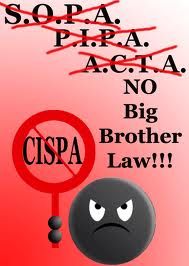Cross posted from The Stars Hollow Gazette
 The controversial data sharing bill, Cyber Intelligence Sharing and Protection Act (CISPA) was passed by the House by a vote of 288 – 127, as 92 Democrats voted for the bill, while 29 Republicans voted against it. The bill passed without the privacy protections that civil liberties advocates felt were necessary, an objection that was echoed by the White House with a veto threat earlier this week. An attempt by the lead sponsors of the bill, Mike Rogers (R-Mich.) and Dutch Ruppersberger (D-Md.), offered an amendment to mollify the objections but privacy advocates stated that it fell short of what was needed to safeguard an individual’s right to privacy.
The controversial data sharing bill, Cyber Intelligence Sharing and Protection Act (CISPA) was passed by the House by a vote of 288 – 127, as 92 Democrats voted for the bill, while 29 Republicans voted against it. The bill passed without the privacy protections that civil liberties advocates felt were necessary, an objection that was echoed by the White House with a veto threat earlier this week. An attempt by the lead sponsors of the bill, Mike Rogers (R-Mich.) and Dutch Ruppersberger (D-Md.), offered an amendment to mollify the objections but privacy advocates stated that it fell short of what was needed to safeguard an individual’s right to privacy.
Amendments that were proposed to protect Fourth Amendment rights were not even allowed debate by the rules committee:
Rep. Alan Grayson, a Florida Democrat, proposed a one-sentence amendment (PDF) that would have required the National Security Agency, the FBI, Homeland Security, and other agencies to secure a “warrant obtained in accordance with the Fourth Amendment” before searching a database for evidence of criminal wrongdoing.
Grayson complained this morning on Twitter that House Republicans “wouldn’t even allow debate on requiring a warrant before a search.” [..]
CISPA is controversial because it overrules all existing federal and state laws by saying “notwithstanding any other provision of law,” including privacy policies and wiretap laws, companies may share cybersecurity-related information “with any other entity, including the federal government.” It would not, however, require them to do so. [..]
Because Grayson’s amendment was not permitted, CISPA will allow the federal government to compile a database of information shared by private companies and search that information for possible violations of hundreds, if not thousands, of criminal laws. [..]
“The government could use this information to investigate gun shows” and football games because of the threat of serious bodily harm if accidents occurred, Polis said. “What do these things even have to do with cybersecurity?… From football to gun show organizing, you’re really far afield.”
At the heart of CISPA is warrantless searches a clear violation of the Fourth Amendment which reads:
“The right of the people to be secure in their persons, houses, papers, and effects, against unreasonable searches and seizures, shall not be violated, and no Warrants shall issue, but upon probable cause, supported by Oath or affirmation, and particularly describing the place to be searched, and the persons or things to be seized.”
This has had a strange effect of uniting the left and right in the opposition to the bill. The Tea Party aligned group Freedom Works issued this statement:
CISPA would allow for more information sharing between the private sector and the federal government regarding cyber security. Although this year’s CISPA is a net improvement over last year’s bill, it still leaves open concerns about private information being shared in the name of national security.
There are grave Fourth Amendment concerns with CISPA. The bill would override existing privacy laws to allow companies to share “cyber threat information” with the federal government without making any reasonable effort to strip out any personal information from the file.
They even have a site to actively Stop CISPA along with the ACLU and the Electronic Freedom Foundation. Strange bedfellows, indeed.
Passage in the Senate without addition of privacy protections is doubtful but one never knows:
The discussion now shifts to the Democrat-controlled Senate, which appears unlikely to act on the legislation in the wake of a presidential veto threat earlier this week, and an executive order in January that may reduce the need for new legislation. Today’s House vote, on the other hand, could increase pressure on the Senate to enact some sort of legislation.
Sen. John Rockefeller, a West Virginia Democrat who was involved in last year’s cybersecurity debate, said after today’s vote that “CISPA’s privacy protections are insufficient.” Still, Rockefeller said, “I believe we can gain bipartisan agreement on bills that we can report out of our committees and allow [Majority Leader Harry Reid] to bring them to the Senate floor as early as possible.”
We urge everyone to keep the pressure on the Senate and the White House by calling and e-mailing your objections:
The White House switchboard is 202-456-1414.
The comments line is 202-456-1111.
The White House email address is here
Numbers for the Senate are here.
E-mail addresses for the Senate are here
Please be polite and on point.
The late internet activist Aaron Swartz called CISPA the “The Patriot Act of the Internet”.
Contact the White House and your Senators to protect your privacy rights.




 The controversial data sharing bill,
The controversial data sharing bill,